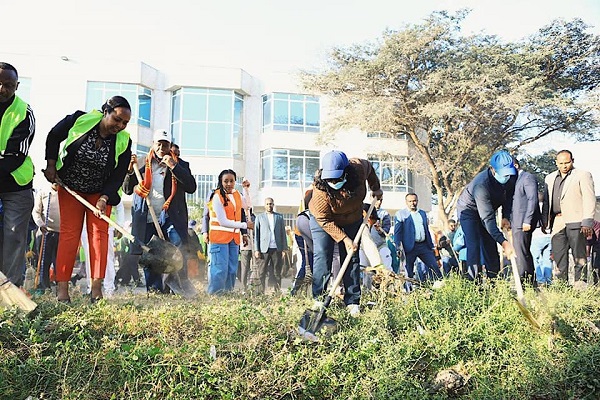
BY EPHREM ANDARAGCHEW
Ethiopia experienced the most shocking case of influenza in 1918 in the Ethiopian month called Hedar (October-November). Then, in many works of literature, the disease was called by the month of its occurrence and called Yehedar Beshita. The death toll because of Yehedar Beshita was estimated at around 50,000 people across the country. Addis Ababa was hit the hardest with a death toll of around 10,000 people.
Although the Yehedar Beshita affected the country and people severely, the end of the epidemic forced social changes to occur by making people more conscious about hygiene and sanitation. Because in order to curb the negative effect of the pandemic, the country ordered every household on Hedar 12 (21st of November) to clean the garbage from houses and burn it.
This has lent a hand to mitigate the spread of the disease as the people sustained the culture of burning garbage as an annual ritual. In the present day, the communities collect and burn their garbage on the 12th of Hedar, on St. Michael Day, with the assumption that it will cleanse the country of any plague.
Taking this instance as a good opportunity, the Addis Ababa city administration uses the month of Hedar (November) to clean the city. The cleaning campaign of “Hedar Setaten” was held across the city. The city Administration has consequently declared three months hygiene campaign program.
Addis Ababa City Administration Mayor Adanech Abebe said that when Hedar (November) comes, our parents taught us the value of cleanliness and how to clean our surroundings to protect ourselves from disease by collecting garbage and burning it. Hence, this culture should continue 24/7 throughout the whole month. For our city to be clean and suitable for its residents, every citizen should contribute by regularly cleaning and beautifying the area by making cleanliness a permanent culture.
To make our waste disposal modern, the city administration handed over a plastic shredding device to the youth associations organized in the cleanup campaign that is invented by Ethiopians. Besides, the city administration will continue the work to modernize the city’s waste disposal system and build a circular economy system that makes the city live up to its name and standards, she added.
Addis Ababa City Administration Deputy Mayor Tiratu Beyene in his part noted that Addis Ababa should be made beautiful, clean, and livable since one of the major requirement urbanism is to make the city clean, beautiful, and green.
In fact, urbanism requires a clean and suitable environment for living. To do so it is imperative to promote urban agriculture, encourage healthy diets, reduce and manage wastes, boost green spaces for healthier environments and improved lifestyles, and reconnect cities with surrounding rural areas.
Achieving a green environment is more difficult than producing environmentally-friendly equipment, car, or green building. However, this does not mean that it is unattainable. Because if the people and the government become on board and work for common agendas, it is possible to clean and green the city.
According to Tiratu, for cleanliness to become a culture of the city, everyone should shoulder their responsibility equally regardless of everything. Strong action also must be taken based on laws and regulations against individuals, organizations, and institutions that carelessly pollute the city. Because keeping the cleanliness and beauty of the city is beneficial to all sections of society.
The work of the city administration should be continued and strengthened to make the city more suitable for its residents. A sustainable and green city is characterized by a happy and healthy community, a green economy, small infrastructure, and low-carbon, bio-diverse, resource, and resilient-efficient.
As Addis Ababa is the capital of Ethiopia, the seat of continental and international organizations, and the diplomatic center, we must fulfill our historic responsibility by keeping the city clean and beautiful in a sustainable manner and passing it on to future generations, he added.
Creating a sustainable, green city needs commitment, cooperation, and hard work from every individual. With the growing economy and climate changes, the need for preserving the environment is more significant than ever before. Hence, Hedar (November) is a turning point to make the city clean and suitable for residence.
The Ethiopian Herald November 30/2022




